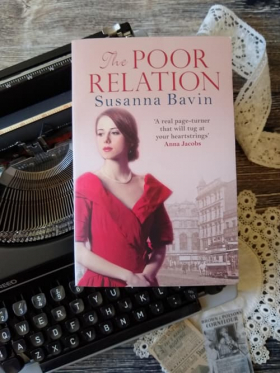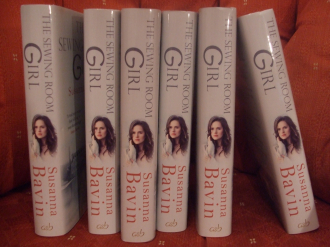A question I am often asked is: How much research do you do before writing a story?
Because of my love of social and domestic history and the reading I have done over the years, I carry a certain amount of residual knowledge in my head. But yes, I also have to do research for each individual book, which is a mixture of the general and the specific.
I usually start by finding out about important events that took place in the year in which the book is set; for example, in The Surplus Girls, there is a passing reference to a coal strike. I also check the calendar for the year. In The Surplus Girls, it would have helped if April Fool’s Day could have been on a weekday, but it wasn’t – it fell on a Saturday, so I had to allow for that.
| I also like to read documents from the time to get a sense of the prevailing attitudes. A letter written by an Edwardian clergyman provided me with a small detail that grew into the plot-strand about Mary’s marriage in The Poor Relation. |  |
 | No research is ever wasted. Back in the 1980s I came across a wonderful snippet of Victorian law that I was dying to use in a story – but it was twenty-something years later before it I was able to insert it naturally into The Sewing Room Girl. |
I think that what’s important in bringing the era to life is to make sure that your knowledge and research aren’t be on show for all to see. I once read a novel in which the writer spent a page and a half describing the history of a particular building. That wasn’t the story, it was a lecture! Getting the details right is important, but they should be a comfortable and natural part of the story.

With the Railway Girls series, I’ve found that the best way to tackle the research is to read a variety of books about the home front without necessarily looking for specific information. If I come across something I want to incorporate into the story, then fine, I make notes, but otherwise I work on the basis that simply having lots of general knowledge will inform my writing in a natural way.
This means that the books I choose have to be enjoyable as well as interesting. My favourite book is undoubtedly How We Lived Then: a History of Everyday Life During the Second World War by Normal Longmate. As well as being the most comprehensive book I have come across, it is also highly readable and entertaining and I recommend it to anybody who has an interest in the subject.
As well as general information, there are also many occasions when I require specific information. For example, the oral history in Female Railway Workers in World War II by Susan Major was invaluable in helping me to choose different railway jobs for my characters. I was amazed by the huge variety of jobs available and, from reader feedback, I know this has fascinated lots of other people too.
I've picked up a lot of new knowledge along the way. Here are three examples for you:
- We think of recycling as being a modern phenomenon, but it was an important feature of everyday life in wartime. (You'll find out more about this in my new Home Front Girls trilogy, which will be published next year.)
- I was astonished (and vastly entertained) by stories of how completely disorienting the blackout could be. There are numerous tales of stone cold sober people leaving buildings and walking outside into surroundings they had known for years and finding themselves wandering around, hopelessly lost in the darkness, or even heading straight into a ditch or a duck pond.
- And you know those little circles of paper you get when you use a hole-puncher? Well, if you’re ever in need of confetti…


Make A Comment
Comments (0)